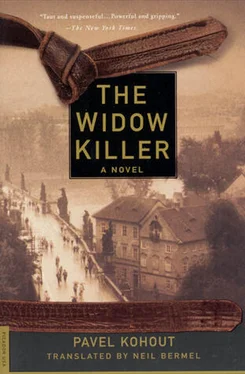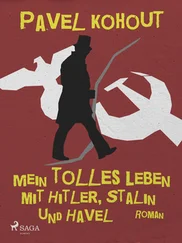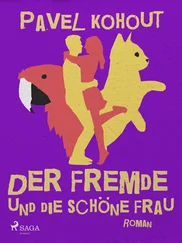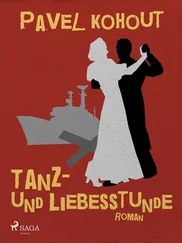Pavel Kohout - The Widow Killer
Здесь есть возможность читать онлайн «Pavel Kohout - The Widow Killer» весь текст электронной книги совершенно бесплатно (целиком полную версию без сокращений). В некоторых случаях можно слушать аудио, скачать через торрент в формате fb2 и присутствует краткое содержание. Год выпуска: 2007, Издательство: St. Martin's Press, Жанр: Современная проза, на английском языке. Описание произведения, (предисловие) а так же отзывы посетителей доступны на портале библиотеки ЛибКат.
- Название:The Widow Killer
- Автор:
- Издательство:St. Martin's Press
- Жанр:
- Год:2007
- ISBN:нет данных
- Рейтинг книги:5 / 5. Голосов: 1
-
Избранное:Добавить в избранное
- Отзывы:
-
Ваша оценка:
- 100
- 1
- 2
- 3
- 4
- 5
The Widow Killer: краткое содержание, описание и аннотация
Предлагаем к чтению аннотацию, описание, краткое содержание или предисловие (зависит от того, что написал сам автор книги «The Widow Killer»). Если вы не нашли необходимую информацию о книге — напишите в комментариях, мы постараемся отыскать её.
The Widow Killer — читать онлайн бесплатно полную книгу (весь текст) целиком
Ниже представлен текст книги, разбитый по страницам. Система сохранения места последней прочитанной страницы, позволяет с удобством читать онлайн бесплатно книгу «The Widow Killer», без необходимости каждый раз заново искать на чём Вы остановились. Поставьте закладку, и сможете в любой момент перейти на страницу, на которой закончили чтение.
Интервал:
Закладка:
He was alone in the enormous building; he had locked up and made his rounds, and could therefore head home. There, however, he would have to REPORT. Instead, he sat down on the wide marble staircase, turned out the light, and tried in the dark to make sense of it. The silence began to hum unbearably, and the sound, which had no discernible source, made him wonder if he was crazy. Or in shock? After all, a large bomb had fallen close by. He knew from the army what a concussion was; a Hungarian grenade had practically fallen on his head in 1920, instantly ending a promising military career. What if this new shock had turned his wishful thinking into a hallucination?
Finally, a thought saved him. The narrow beam of his flashlight led him down to the cellar; years of practice let him choose the keys from the large ring by touch. He spat angrily at the stone-cold furnace; they’d shivered all through February in winter coats, since the Krauts had requisitioned all the coal. By the back wall, blocks of ice gleamed.
In December, when they stacked the cellar with thick slices cut from the frozen river, he had prudently scouted out a corner where there were already more than three dozen pieces; IT would be safe here through May. Although he could now turn the lights on, he stuck with his flashlight. He leaned against the wall, stretching his free hand behind the ice slabs as far as it would go. His fingers grasped and dislodged a small package.
He put the light on the ground to have both hands free, and unwrapped the wax paper very nervously, because the item inside was unnaturally hard. But it was THE ONE! It was frozen, that’s all; how could he have doubted? He congratulated himself for having anticipated this crisis. It was here, his DEED, imprisoning the wretched soul which could not fly away.
He arrived home at peace. His mind, free now of distractions, was calm: those fucking policemen had kept his triumph secret! It seemed even more unfair to him when he remembered the way they had harped on his first failure. Will and ambition made him bold again. Finally he had something to tell HER.
So be it: I will strike again, and SOONER than I planned to! And then AGAIN AND AGAIN! We’ll see whose nerves are stronger. Three will be enough to start it going; censorship is powerless in this country against rumors.
Still, he lacked the strength he had last felt in the house on the embankment. It had melted away as he wearily half sat, half lay on the park bench. Lunch at Angel’s had seemed to set him right, but later on the train he had fallen into a torpor he could not shake off.
The next day he managed to leave work while it was still light. He chose a longer route through the city park to air the unheated building’s mildewy stench out of his clothes and noticed the celebrations. A couple of pathetic booths were bravely pretending, in this sixth wartime winter, to be a Lenten fair. He passed a shooting range, where a youth in a long coat hit five paper roses and the owner grudgingly gave him a prize. He stopped and stared. It was the thing he’d longed for since childhood: a Habe  an. Of course, the large puppet was only a shadow of the prewar ones in their shiny colored satins, but here it shone brightly among the other trophies, the highest attainable goal.
an. Of course, the large puppet was only a shadow of the prewar ones in their shiny colored satins, but here it shone brightly among the other trophies, the highest attainable goal.
He found himself enviously eyeing the happy winner as a handful of the youth’s peers applauded. The boy gave the black turbaned doll to a girl, making another nearby plead for one as well. The sharpshooter looked embarrassed and balked. He dismissed his friends’ insistence and the overlooked girl’s reproaches. “I’d never be able to do it twice,” he said.
The stand owner must have thought so too and sensed a chance to recoup part of his losses. Finally the young man could not resist the pressure and bought five more shots.
He looked on, paralyzed, recognizing his own dilemma: he too was holding back, out of fear that his single success could not be repeated, that next time he would make a laughingstock of himself again. He knew from his stint in the army that even with a well-maintained weapon, there was almost no likelihood of a second round as good as the first. He faced his own failure as the youth carefully lined up his five lead shots, breaking open and reloading the gun. His fate is my fate, he told himself despondently.
His head cleared when he heard the clamor. The angry stall owner was giving the second girl a Habe  an as well.
an as well.
The image of the puppet lulled him to sleep that night. And when he woke up, he knew he was READY again. Time to find himself an alibi, the instruments, and some new clothes.
Quiet wonder was the only description that fit Jan and Jitka’s state “afterward.” Throughout their lovemaking she remained silent, although her rushed breath would slowly grow calmer and her eyes, even now, would look at him with the same surprised expression as on the night of February fourteenth, when a new furrow of bombs had threatened to rip across Prague. At that moment he firmly believed that not only would he survive the death throes of the war, but he would live eternally in a suspended moment of grace named Jitka.
Even in that first darkness, which stripped them of their inborn shame with unexpected ease, he felt that this was a moment of truth for both of them. Both came from honorable Moravian stock, where, from time immemorial, couples had first known each other on their wedding night. They confessed the next day how shocked they were at their own boldness, but soon their consciences were appeased by the tacit understanding that they would marry as soon as possible.
Without even asking, he accompanied her home the next day as well, and she did not seem at all surprised. She made him her grandmother’s potato soup with dried mushrooms, and then they talked about their families — as it turned out, from villages quite near each other. The conversation was so ordinary that he felt ashamed again. Everything he had ignored the day before, when immediate, irrepressible desire had made it so simple and natural, suddenly became a puzzle. What would happen from here? Where to start? What to say? How to touch her? He bitterly regretted the awkward ignorance and powerlessness that made him feel so uncertain, and finally he decided to slink home to his den. But Jitka just smiled at him and stretched out her hand to the lamp. How simple, he thought gratefully amid the rustling of sheets and clothes; his cheeks were still burning, but after that there was nothing but bliss.
This ritual repeated itself every evening, and Morava soon realized that the same steps led a different way each time. It seemed he was constantly charting a new path across an unknown landscape, but at the same time Jitka was uncovering more layers in him as well.
Morning celebrations soon joined their evening ones. They grew accustomed to falling asleep and waking up in each other’s arms: his chin in her hair, her mouth clinging to his breast. They would greet each other with sleepy smiles and a kiss scented with childhood, and close their eyes again until the shrill ring of the alarm clock drove them out of bed.
This silent morning motionlessness opened a new dimension of love in him, and when he would meet Jitka at work later or even just think about her, this was what he remembered. Those Moravian traditions were so ingrained in his character that he never imagined his loved one as she gave herself to him; instead he pictured her in that miraculous state of repose, where instead of touching her body he seemed to approach her soul.
The horrors of their work were implicitly left behind on Bartolom  jská Street when the day ended, and they did not waste words on them at home. However, they consciously let the atrocities of war intrude on them more and more each evening. Jan Morava would plug a well-hidden spool (commonly called a churchill) into the radio and cast through the signal jammers’ waves for Czech voices bringing hope and fear. Day by day it grew clearer that the world’s struggle against the Third Reich would be decided in the battle for the Protectorate of Böhmen und Mähren.
jská Street when the day ended, and they did not waste words on them at home. However, they consciously let the atrocities of war intrude on them more and more each evening. Jan Morava would plug a well-hidden spool (commonly called a churchill) into the radio and cast through the signal jammers’ waves for Czech voices bringing hope and fear. Day by day it grew clearer that the world’s struggle against the Third Reich would be decided in the battle for the Protectorate of Böhmen und Mähren.
Интервал:
Закладка:
Похожие книги на «The Widow Killer»
Представляем Вашему вниманию похожие книги на «The Widow Killer» списком для выбора. Мы отобрали схожую по названию и смыслу литературу в надежде предоставить читателям больше вариантов отыскать новые, интересные, ещё непрочитанные произведения.
Обсуждение, отзывы о книге «The Widow Killer» и просто собственные мнения читателей. Оставьте ваши комментарии, напишите, что Вы думаете о произведении, его смысле или главных героях. Укажите что конкретно понравилось, а что нет, и почему Вы так считаете.












